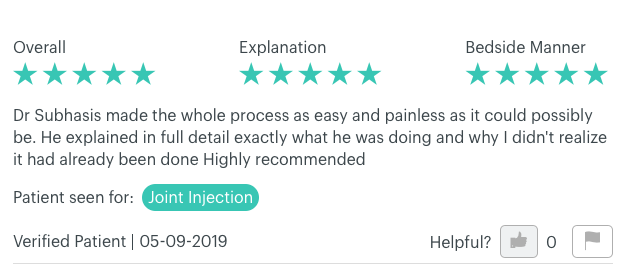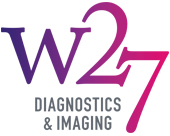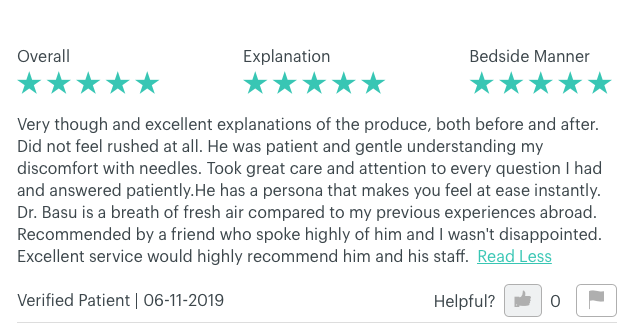Platelet Rich Plasma (PRP) injections belong to an emerging field of treatment called orthobiologics, which use new technologies to support the body’s natural healing processes.
In PRP treatment, an injection of blood plasma taken from your own body is used to treat tendon and joint injuries and damage caused by osteoarthritis. The treatment promotes healing at a cellular level and can help to relieve pain and improve movement. It is particularly used to treat upper and lower limbs, but can also be effective for certain types of hip pain.
What is platelet-rich plasma?
Platelets are a naturally occurring component in your blood, alongside red and white blood cells and plasma, which is the liquid part of your blood. Platelets contain proteins called growth factors, which are vital for forming blood clots.
Platelet-rich plasma contains a higher concentration of these growth factors than are normally found in the blood. By increasing the concentration of platelets by between five and ten per cent, their healing properties are significantly enhanced. A concentration of platelets mixed with your body’s own plasma, is injected into damaged areas to promote healing and regeneration.
What are PRP injections used for?
PRP injections can be used to treat a wide range of orthopaedic conditions that have not healed following a period of rest and rehabilitation. These include:
- Tendinopathy of the ankle (Achilles tendinopathy), knee (patella/quadriceps tendinopathy) and hip (gluteal tendinopathy).
- Lateral/medial epicondylitis which affects the elbow.
- Plantar fasciitis which affects the foot.
- Jumper’s knee.

How does it relieve pain?
PRP injections act in a number of different ways to relieve pain. The platelets initiate tissue repair and regeneration and stimulate healing. They also promote the development of new blood vessels, increasing blood supply to the area which supports healing.
What does the procedure entail?
PRP injections are administered by a radiologist. The procedure is carried out as an outpatient and normally takes less than an hour. Blood is taken from your arm in the normal way.
The blood sample is then placed inside a centrifuge machine which spins it at high speed for up to 15 minutes to separate it into its component parts. The platelet-rich blood and plasma is removed and placed into a syringe. After cleaning the skin with a sterile solution, local anaesthetic will be injected into the affected area.
An ultrasound machine is then used to guide the PRP injection, ensuring that it targets precisely the right area of damage or injury. The platelet rich plasma is injected and the wound is covered with a dressing.
Afterwards it is common to experience mild discomfort or throbbing around the injection site. You can take painkillers but should avoid anti-inflammatories for 10-14 days after the procedure. It is advisable to avoid doing anything too strenuous for a few days.
You will normally start to experience relief from symptoms after a few weeks. In some cases, it can take several months to experience the full benefits of PRP.
Benefits of PRP injections
PRP injections help to relieve pain and improve movement in painful and damaged joints. The procedure is safer and less invasive than surgery, with less risk of infection or scarring. Combined with physiotherapy, it can support long-term relief from symptoms.
It can take weeks or even months for the full benefits to be felt, however, following treatment the area should heal faster than it would have done by itself. It is generally a safe procedure as the fact that the blood is taken from your own body means the risk of an allergic reaction are very small.
There is a very minor risk of nerve or tissue damage or infection, which your radiologist will discuss with you prior to the procedure.
PRP INJECTIONS | MANCHESTER, WIGAN, CHESHIRE + MORE
W27 provides PRP Injections to help with musculoskeletal pain management and can be used to prolong the need for surgery.
For your appointment there is a choice of locations:
The John Charnley Wing, Wrightington Hospital – Hall Lane, Appley Bridge, Wigan, WN6 9EP
HCA Manchester Institute of Health & Performance – 299 Alan Turing Way, Manchester, M11 3BS
Euxton Hall Hospital – Wigan Road, Euxton, Chorley, PR7 6DY
The Spire Manchester – 170 Barlow Moor Road, Didsbury, Manchester, M20 2AF
Harley Street Musculoskeletal Clinic – 136 Harley Street, London, W1G 7JZ
The OrthTeam Centre Ohm Building – 168 Barlow Moor Road, Manchester, M20 2AF
Information about our Fees can be found here.
If you have any questions or would like to discuss your options with a specialist, please contact the team to book an initial consultation.









